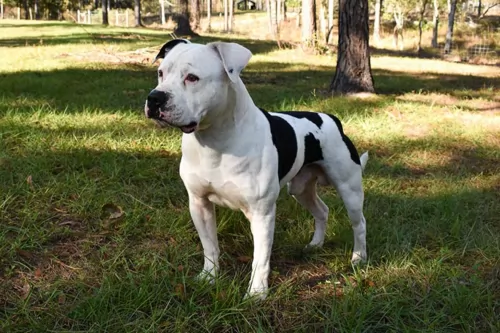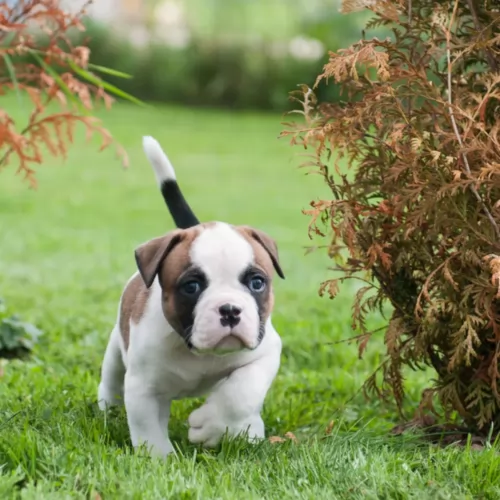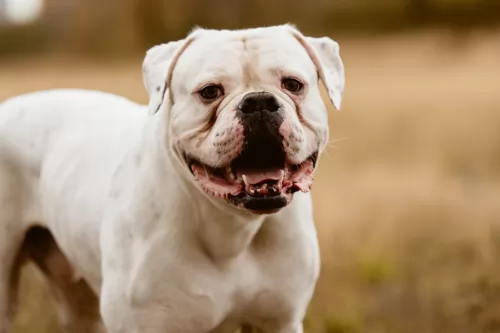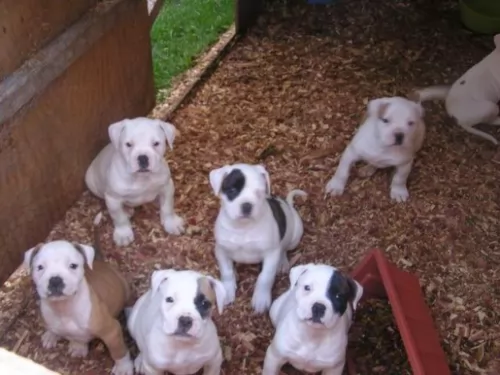 Petzlover
Petzlover Both American Bulldog and Chesapeake Bay Retriever are originated from United States. Both American Bulldog and Chesapeake Bay Retriever are having almost same height. American Bulldog may weigh 9 kg / 20 pounds more than Chesapeake Bay Retriever. American Bulldog may live 3 years more than Chesapeake Bay Retriever. Both American Bulldog and Chesapeake Bay Retriever has almost same litter size. Both American Bulldog and Chesapeake Bay Retriever requires Low Maintenance.
Both American Bulldog and Chesapeake Bay Retriever are originated from United States. Both American Bulldog and Chesapeake Bay Retriever are having almost same height. American Bulldog may weigh 9 kg / 20 pounds more than Chesapeake Bay Retriever. American Bulldog may live 3 years more than Chesapeake Bay Retriever. Both American Bulldog and Chesapeake Bay Retriever has almost same litter size. Both American Bulldog and Chesapeake Bay Retriever requires Low Maintenance.
 Following World War II, the American Bulldog was almost extinct.
Following World War II, the American Bulldog was almost extinct.
Thanks to John D. Johnson from Summerville, Georgia the breed is still with us today. He gathered the best dogs he could find throughout the rural South and bred them back into popularity among his family and other rural families. His father bred the American Bulldog before John did and they have bred them longer than any other in any part of the world. His dogs were regularly used for tracking, hunting, guarding, watchdog and weight pulling. At some point Alan Scott joined Johnson breeding other bulldogs to Johnson's and forming the Standard American Bulldog.
The American Bulldog/ is popular today as a family pet and companion as well as a working dog.
 Fondly referred to as the Chessie, the ‘Labrador-look-alike’ Chesapeake Bay Retriever’s history extends to St. Johns Newfoundland pups which were rescued off a ship off the coast of Maryland in 1807. The Chesapeake is an American breed.
Fondly referred to as the Chessie, the ‘Labrador-look-alike’ Chesapeake Bay Retriever’s history extends to St. Johns Newfoundland pups which were rescued off a ship off the coast of Maryland in 1807. The Chesapeake is an American breed.
It is believed that the Newfoundland puppies as they grew, were bred with area dogs, with there being few records of the early dogs, but it is believed that spaniels and dogs were included.
In 1918 the Chesapeake Bay Retriever was recognized by the American Kennel Club and in 1964 the dog was declared the official dog of Maryland.
 The American Bulldog is a powerful and muscular dog in a sturdy and compact frame. The female is more refined than the heavy boned and stocky male, but both genders are athletic, agile and quick. The have large heads, strong jaws, a muscular neck and with a moderately deep and wide chest.
The American Bulldog is a powerful and muscular dog in a sturdy and compact frame. The female is more refined than the heavy boned and stocky male, but both genders are athletic, agile and quick. The have large heads, strong jaws, a muscular neck and with a moderately deep and wide chest.
They have a square head, with muscular cheeks and a clearly defined furrow between his eyes. With broad, square and strong muzzles, they have a reverse scissors, scissors, moderate underbite and an even bite. Ears come in a variety of shapes and sizes and eyes can be any color as well. The nose however should be black and lips black as well. Their legs are strong, heavy boned and straight with well-defined muscles in the hindquarters. Finally ,they have a thick, low set tail that comes to a point at the end.
 The Chesapeake is a large dog belonging to the Sporting breed group. Perhaps one of the more distinctive features of the Chesapeake Bay Retriever is the yellowish eyes.
The Chesapeake is a large dog belonging to the Sporting breed group. Perhaps one of the more distinctive features of the Chesapeake Bay Retriever is the yellowish eyes.
This is a strong, well muscled dog that stands anywhere from 61 – 66cm and weighs between 30 – 45kg. The short, thick coat of the dog is waterproof and comes in colors ranging from brown to reddish yellow to chestnut shades.
The head of the Chesapeake is broad and roundish with medium length floppy ears. The tail is long. The toes are webbed which helps makes the dog an excellent swimmer as well.
The Chesapeake Bay Retriever is a happy kind of dog with a bright, alert, intelligent expression. He loves water and is guaranteed to make a wonderful pet for any family.
With his wonderful characteristics, it is worth training him and socializing him as this training sets parameters for him so that he becomes a wonderfully obedient dog that gets on well with other pets in the home as well as with children.
 The American Bulldog is characteristically loyal, brave and reliable. It is a friendly, gentle dog that truly loves children. There is not a hostile bone in his body despite his history and reputation for bull baiting. Though he is protective of its family and affectionate with most, he still needs a human companion who is strong willed and a genuine pack leader. Without this he might become aggressive around other dogs and pets. They are immensely self-confident and they do slobber and drool and will become excited and hard to handle without daily exercise of both their body and their minds.
The American Bulldog is characteristically loyal, brave and reliable. It is a friendly, gentle dog that truly loves children. There is not a hostile bone in his body despite his history and reputation for bull baiting. Though he is protective of its family and affectionate with most, he still needs a human companion who is strong willed and a genuine pack leader. Without this he might become aggressive around other dogs and pets. They are immensely self-confident and they do slobber and drool and will become excited and hard to handle without daily exercise of both their body and their minds.
 The Chesapeake Bay Retriever is ready to be your best friend and companion. This dog breed is highly active and he’ll fit easily into a family that is active and can ensure he is involved in all their activities.
The Chesapeake Bay Retriever is ready to be your best friend and companion. This dog breed is highly active and he’ll fit easily into a family that is active and can ensure he is involved in all their activities.
The beauty about the Chesapeake Bay Retriever is that he is generally an even tempered dog, and once trained and socialized, becomes a truly splendid pet, one that will be loving and loyal with his owners.
 Though generally healthy, the American Bulldog is prone to a few problems.
Though generally healthy, the American Bulldog is prone to a few problems.
This is a serious issue in many breeds of dogs and is especially prevalent with the American Bull Dog. This may seem ironic in such a short legged dog but it is unfortunately very common. It is a genetic disorder that causes the bones in the joint to separate and causes the dog much pain and lameness.
Due to skin folds you need to be care and watch for irritation and infection in the folds. They are also prone to ear infections.
The American Bulldog is prone to overeating and all the health issues that presents. With short legs and a genetic predisposition to arthritis and hip dysplasia, obesity is a real health risk for your bulldog.
 By taking good care of your Chesapeake, you can ensure his teeth remain strong, his nose is wet and his coat glossy and healthy. He is a robust breed as it is, but there are always some common dog diseases to watch out for -
By taking good care of your Chesapeake, you can ensure his teeth remain strong, his nose is wet and his coat glossy and healthy. He is a robust breed as it is, but there are always some common dog diseases to watch out for -
Obesity is an ailment that is afflicting many humans and their pets. Being overweight can bring on a host of unwanted diseases. Obesity is a serious disease that can contribute to digestive disorders, back pain, heart disease and joint problems.
Instead of showering him with little treats to show him how much you love him, rather stroke him or play a game with him – it’s the ultimate treat for him – your attention.
Remember that if you aren’t going to let your Chessie become a parent, the best thing you can do for your male or female is to have them spayed or neutered. In fact, spaying or neutering can decrease the likelihood of your pet getting certain types of cancers as well as other illnesses. Speak to your vet and discover how these procedures can be very beneficial for your pet.
 The Chesapeake Bay Retriever sheds fairly heavily throughout the year. The coat should be brushed at least twice a week to remove dead hair. Brushing is good for the dog too as it distributes the oils of the skin, making his coat shinier.
The Chesapeake Bay Retriever sheds fairly heavily throughout the year. The coat should be brushed at least twice a week to remove dead hair. Brushing is good for the dog too as it distributes the oils of the skin, making his coat shinier.
Because the Chesapeake has floppy ears, the ears will need to be checked on a weekly basis for signs of infection. This is of particular importance if your Chessie loves to spend time splashing around in water. The veterinarian can recommend and also advise on cleaners for your dog’s ears.
An excellent diet and plenty of exercise will ensure your Chessie can live to be 11, 12 or 13 years of age. You want to keep his diet of kibble, rice, vegetables and meat consistent so as not to upset his stomach.
Avoid giving him foods such as chocolates. Do research on the harm you can do to your pet when you feed him some human foods that are entirely not meant for a dog’s digestive system.
The Chesapeake Bay Retriever has always loved to be active - hunting for- and retrieving birds from rivers and lakes. He is used to being active and will require a good supply of exercise. Take him for long walks and let him join you on your runs or your cycling.